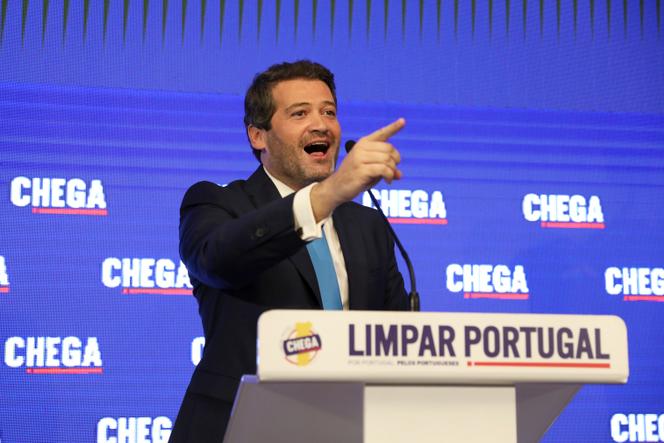


On Sunday, March 10, almost 11 million Portuguese people went to the polls to elect members of the Assembly of the Republic. However, none of the parties on the ballot appear to be capable of forming a stable majority to govern the country. Not the Parti Socialiste (PS), which lost 13 points compared to the 2022 legislative elections, with 28.7 % of the vote and 77 seats, and its comfortable absolute majority. Nor the center-right coalition Democratic Alliance (AD), which came out on top – 29.5 %, 79 seats – with a lead that is not only very narrow but not definitive until the overseas vote is counted.
In the absence of a clear winner, the far-right Chega ("that's enough") party appears to be the real beneficiary of the election. With 18.1 % of the vote, 11 points more than in 2022, it took 48 seats in the Assembly, out of 230. "Tonight we put an end to the two-party system," boasted the party's leader, 41-year-old former sports commentator André Ventura. "Chega wanted to become a central part of the political system, and we succeeded."
Eager to join the government, he used the podium to again put pressure on the conservative AD coalition, led by the leader of the center-right Social Democratic Party (PSD), Luis Montenegro, with the right-wing Democratic and Social Centre (CDS) and a small monarchist party. "Only an irresponsible party would let the PS govern when we have the opportunity to build a government of change", he warned.
Throughout the campaign, Montenegro, 51, was adamant that he would not govern with Chega. On Sunday evening, he repeated his mantra – "no means no" – while also saying he was open to "dialogue and consultation between parties and leaders," including Chega, in order to "offer the country conditions of governance and stability".
The final results and the resulting distribution of the last four seats will not be known until April 20, when the votes of 1.5 million Portuguese emigrants will be included. Whoever is named prime minister by conservative president Marcelo Rebelo de Sousa will then have to win the confidence of the House. In 2022, three of the four seats reserved for the large number of Portuguese emigrants were won by the PS. If this were to happen again, it could put it in the lead. However, the contingent of Portuguese "Bolsonarists" settled in Brazil, supporters of that country's former far-right president Jair Bolsonaro, could now favor Chega.
Even if it were to take the lead after the final count, the PS would find itself unable to build a majority, as its decline did not benefit its former allies in the Bloco de esquerda (radical left, 4.5 %, 5 seats) and the Communist Party (3.3 %, 4 seats). "The Parti Socialiste will be the leader of the opposition," said former housing and infrastructure minister Pedro Nuno Santos, 46, the lead candidate and new secretary-general belonging to the left wing of the Parti Socialiste. "We will never let André Ventura become the leader of the opposition," he said, ruling out any possible legislative agreement between the PS and the PSD. He was, however, willing to facilitate Montenegro's nomination to avoid him entering into a coalition with Chega. "There are not 18 % of Portuguese people who are racist and xenophobic, but there are a lot who are pissed off," he insisted.
You have 25.72% of this article left to read. The rest is for subscribers only.
